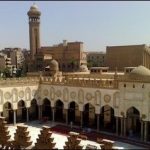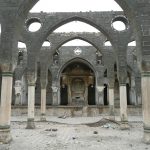Youssef Sidhom – Watani –
In its 20 August issue, Watani carried the headline “In Minya: 15 closed churches and 70 villages without churches”. The headline of the following issue of 27 August ran: “Ezbet al-Furn’s Copts in Abu-Qurqas hold prayers in the street to celebrate the feast of the Assumption of the Holy Virgin”.
For a very long time, Copts in Egypt have been deprived of their constitutional right to pray, worship and practise religious rites. This gave rise to a pile-up of Coptic bitterness and sense of indignity that amounts to a ticking time bomb. I believe officials must understand the gravity of the situation, which obviously escapes many.
In August 2013, Islamist Muslim Brotherhood (MB) terrorists targeted some 100 churches and Coptic institutions, looting and burning. Copts realised then that it was not they who were being targeted; rather, it was Egypt in her entirety. It was the Islamist revenge against Egyptians who in their millions rose and got rid of the MB regime that came to power in the wake of the 2011 Arab Spring. So the Copts, as the true Egyptians that they are, and fully realising they were being cruelly used to undermine the nation, kept their peace and never complained; Pope Tawadros made his by-now famous declaration: “A homeland with no churches is better than churches and no homeland … if they deprive us from praying in churches we will pray in the street.”
Deprivation from prayer, however, was nothing new to Copts. In that lone incident in 2013, it was used to target all of Egypt, but prior to and following that incident it has been an ongoing pain in the hearts and souls of Copts. It peaked last month in Minya where the Copts were banned from praying; worse, those who banned them from praying were not the extremists, fanatics or fundamentalists, but members of the local government and security apparatus. Officials in these apparatuses bury their heads in the sand to evade the fact that they have no qualms with closing already existing churches, under the pretext of security reasons. They delay reopening them or legalising their status in accordance with the Law for Building and Restoring Churches and its bylaws, and impede the licensing of new churches. Then they rise to defend the Constitution and law, claiming it is their responsibility to ban Copts from worshipping in non-licensed places. Oh yes?! Do Copts resort to praying in unlicensed places because they enjoy violating the law? Do cities, towns, villages and hamlets include adequate numbers of licensed churches that Copts should pray in houses, streets, or courtyards?
Administrative and security apparatuses have exercised efforts and might to pursue Copts, besiege them, and prevent them from practising their religious rites. They would have done infinitely better had they employed this effort to write political and security reports that advise the imperativeness of opening closed churches and the dire need to license new churches to fulfil Copts’ needs in accordance with the Constitution and law. Or do these apparatuses only remember the Constitution and the law when they decide to crack down on Copts?
Should it take a new incident of vicious sectarian violence in Minya for President Sisi to take notice that Coptic sentiments in Minya are running high with bitterness at the injustice and indignity they suffer at the hands of local State apparatuses for the mere desire to exercise their right to worship? Will he then calm the Copts down with his honeyed talk, and expect Pope Tawadros to contain their anger with patriotic declarations? Will he give orders to the relevant authorities to open churches and protect worshippers? Does Minya have to burn in order for us to realise the magnitude of the crime taking place there and the injustice inflicted upon Copts? This time, the injustice is not owing to terrorism, fanaticism or extremism. Watani’s reporting has made it eminently clear that it is security officials who, under the lame pretext of preserving social peace and not provoking Muslims, are objecting to Coptic worship. Does the Constitution in any way demand of Copts to succumb to tyranny for the sake of allegedly not provoking Muslims?
It is time President Sisi and his aides realise that Minya is boiling over, and that the Coptic sense of injustice, bitterness and despair has peaked. More than a year ago I wrote under the title “Minya Independent Islamic Republic” of violations committed against Copts by Muslim extremists. This time round, the heading points fingers to local government and security officials.
____________________
http://en.wataninet.com/opinion/editorial/minya-independent-islamic-republic/16955/].





